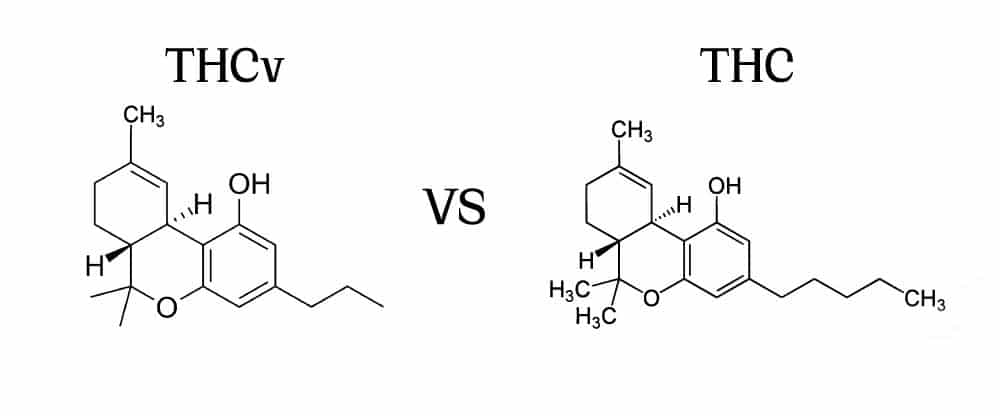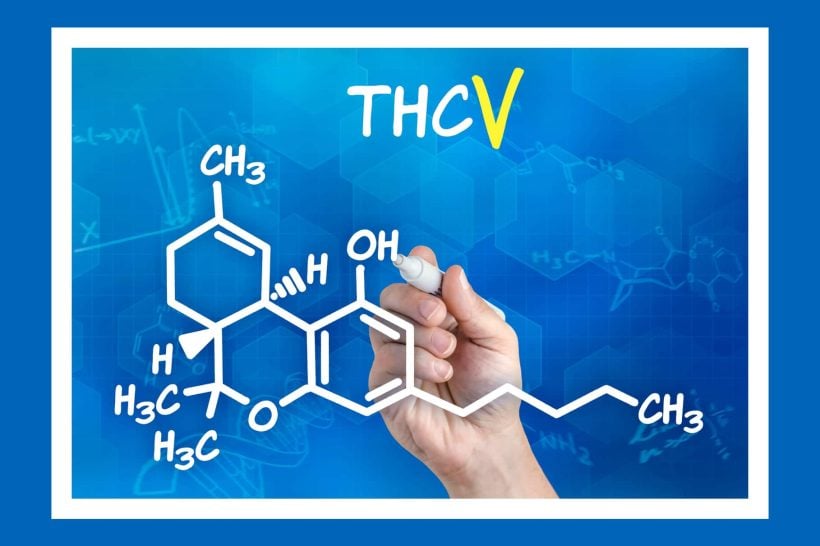What Is THCV?
From a chemical standpoint, THCV is labeled as a propyl analogue of THC. These two cannabinoids share very similar molecular structures, with the sole difference being a three-carbon molecular group rather than THC’s five-carbon molecular group. It turns out that those two missing carbons create significant changes in the way THC and THCV interact with and influence the human brain and nervous system. As will be explained later, THCV often becomes the yin to THC’s yang.

Does THCV Get You High?
THCV is often described in older research as being non-psychoactive, but that may not be the whole story. In a majority of traditional marijuana strains, it is a secondary cannabinoid that occurs in low quantities and may be overshadowed by the effects of THC. However, cannabis horticulturists are now creating new strains with elevated THCV content, and that may change the equation.
How Psychoactive Is THCV?
New information comes from one of the first human trials on THCV’s psychoactive potential, which was published in the September 2023 issue of Cannabis and Cannabinoid Research. Adult volunteers were provided with oral THCV products in doses ranging from 25 to 200 mg. Based on self-reported effects and a series of cognitive tests, the authors reported:
- The most common effect was a sense of euphoria.
- At lower doses, participants reported feeling more energetic.
- At both lower and higher doses participants scored higher than placebo participants on a digital vigilance test.
- At high doses (100 and 200mg) participants were more likely to report feeling they were under the effects of a drug.
- As compared to THC, the effects of THCV seemed to be shorter in duration.
In concluding remarks, the authors note:
All doses displayed a favorable safety profile. Several doses showed a preliminary signal for improved sustained attention. Though mild and not associated with impairment, THC-like effects were observed at higher doses.
How Does THCV Affect The Brain?
Cannabinoids, such as THC and THCV, found in marijuana can bind with and influence the human body’s cannabinoid system by attaching to neural gateways known as CB1 and CB2 receptors. Understanding the interplay of different cannabinoids and their combined influence via CB1 and CB2 receptors allows us to answer some of the most pressing questions about THCV.
This description comes from a study published in a 2020 edition of the Journal of Cannabis Research:
THCV is a naturally occurring analog of THC. Unlike THC, which is psychoactive and an agonist at the CB1 and CB2 receptors, THCV is a non-psychoactive, neutral CB1 antagonist/inverse agonist and may act as an agonist or antagonist at the CB2 receptors depending on its dose.
Understanding this statement and its implications begins with some definitions of terms.
- Agonists are chemical substances that bind to and activate certain receptors on cells, causing a biological response.
- Antagonists are chemical substances that bind to and block the activation of certain receptors on cells, preventing a biological response.
- Inverse agonists create the opposite effects of agonists.
Put into everyday terms as an automotive analogy, we have: gas (agonists), brakes (antagonist), and reverse (inverse agonist).
How Does THCV Compare To THC?
THC has a strong affinity for CB1 receptors, which are concentrated in the brain. Its role as a CB1 agonist creates the well-known psychoactive effects of a marijuana “high”. THCV also binds with CB1 receptors, though to a lesser degree. Because it is an inverse agonist to THC, it can cancel out some of the psychoactive effects of THC.
This effect was noted in the Journal of Psychopharmacology. In what is considered the first human-based trial of THC and THCV used in combination, ten male volunteers were given daily doses of THCV for a period of five days. On the fifth day, the subjects also received a dose of THC. A summary of the study results show:
- Initial doses of THCV alone didn’t produce noticeable psychoactive effects.
- Adding THC to the daily dose created sensations of being high, but didn’t produce psychotic effects, paranoia, or impairments to short-term memory.
- THCV inhibited THC-induced increased heart rate.
- Nine out of ten subjects reported that the effects of THC were milder.
- The combination seemed to increase memory intrusions.
In their conclusions, the authors noted the potentially limited implications of their findings based on the small sample size and relatively low doses of THC administered.
A research paper presented at the September 2024 conference of the International Cannabinoid Research Society detailed the results of a study involving 36 current cannabis users who were provided gummies containing a placebo, THCV (6.5mg) + THC (3.4 mg) or THC (5 mg THC). The authors reported:
- Participants felt that THCV + THC gummies boosted their overall motivation, energy, and activity levels while creating a sense of well-being.
- Three times more participants reported fatigue when taking THC alone as compared to the combined dosage, suggesting that THCV may alleviate symptoms of fatigue associated with THC.
Does THCV Help Control Appetite?
Unlike THC, which is largely responsible for “the munchies” and is used by cancer patients and others to stimulate appetite, THCV may dull hunger pains by blocking the receptors that trigger hunger responses. An explanation of this phenomenon comes from the Journal of Psychopharmacology study mentioned earlier:
THCV ameliorated the increase in appetite associated with THC consumption. Hunger is mediated by the hypothalamus. CB1 agonists like THC increase hunger. THCV, as an antagonist of the CB1 receptor, blocks that effect.
In addition to suppressing CB1-generated hunger responses, THCV may suppress appetite by activating CB2 receptors. A recent survey of literature published in the International Journal Of Molecular Science confirms that CB2 receptors play a key role in appetite. The activation of these receptors can reduce hunger sensations.
Can THCV Help With Weight Loss?
Appetite suppression is one key to shedding the pounds, but there’s more going on with THCV than just keeping you out of the cookie jar. A growing body of evidence suggests that it may promote weight loss by regulating key metabolic triggers.
Early evidence of THCV’s potential for weight management came from animal research. Among the first indications was a study at the University of Aberdeen showing that an extract of pure THCV provided both appetite suppression and weight loss in mice. Interestingly, dosages that also contained THC did not produce the same weight-loss effects, but the addition of CBD to the mix offset the negating effects of THC.
A mouse-based study presented at the European Congress on Obesity showed that THCV reduced body fat. The following year, Nutrition and Diabetes published a study showing that THCV reduced glucose intolerance and insulin sensitivity in mice. Elevated levels of glucose intolerance and insulin sensitivity are associated with an increased risk of obesity, cardiovascular problems, and type-2 diabetes.
One of the first human trials of THCV’s influence on metabolic health and weight control was conducted by the University of Nottingham, as reported in Diabetes Care. This research showed that THCV reduced blood sugar levels in patients with type-2 diabetes. Results also indicated that a combination of THCV and CBD boosted the production of a key amino acid responsible for stabilizing blood sugar levels and reduced resistin levels in fat cells. Elevated production of resistin is linked to obesity, insulin resistance, and diabetes.
In the spring of 2024, a study published in Cannabis caught the attention of the popular press and is now cited as the most conclusive evidence to date of THCV’s potential for weight loss. The study, conducted at the University of Central Florida, recruited 44 obese but otherwise healthy adults showing early-stage symptoms of metabolic syndrome.
The National Institutes of Health (NIH) defines metabolic syndrome as:
[A] group of conditions that together raise your risk of coronary heart disease, diabetes, stroke, and other serious health problems. Metabolic syndrome is also called insulin resistance syndrome.
The NIH adds that you may have metabolic syndrome if you have three or more of the following conditions:
- A large waistline
- High blood pressure
- High blood sugar levels
- High blood triglycerides
- Low HDL cholesterol
For 90 days, participants in the University of Central Florida study were given orally dissolving medication strips containing a daily dose of THCV and CBD (8 mg /10 mg or 16 mg /20 mg) or a placebo dose.
Reporting on the results, the author, Gregory Smith, MD, states:
Use of the THCV/CBD strip was associated with statistically significant weight loss, decreases in abdominal girth, systolic blood pressure, and total and LDL cholesterol.
He also concluded that, while both dosages provided benefits, the higher 16 mg/20 mg daily dose was superior for weight loss compared to the 8 mg/10 mg daily dose.
Where Can You Find THCV?
A decade ago, it was difficult to find THCV in significant quantities. As mentioned earlier, THCV is found in many strains of heirloom marijuana but typically makes up less than 1% of the cannabinoid content. In the years since, cannabis horticulturalists have focused attention on creating new strains with elevated THCV content, and various consumer sites provide lists of flower products with elevated THCV levels.
Which Strain Has The Highest THCV?
While lists can be helpful, the best way to source THCV-rich cannabis is with advice from one of Florida’s approved medical marijuana dispensaries, which can be accessed by patients holding medical marijuana certifications issued by qualified physician groups like CannaMD.
In addition to flower products, the medical cannabis industry is now producing high-potency THCV extracts that can be incorporated into a variety of products such as oils, tinctures, and edibles.
Do You Have Questions About Medical Marijuana?
CannaMD‘s team of certified medical marijuana doctors are prepared to answer any questions you might have! You can reach us at (855) 420-9170. You can also find out if you qualify for medical marijuana with our quick online application.




